- Home
- Mark Zubro
A Conspiracy of Fear Page 4
A Conspiracy of Fear Read online
Page 4
I dragged Traverno around so he was behind the sculpture’s base.
I could see bullets ripping holes and tearing into people’s flesh. Those who could move were trying to scramble to safety. Some dashed toward the interior of the gallery. The wounded screamed or tried to crawl to the nearest shelter.
I rushed to Scott and the teens where they lay exposed on the floor. I squatted, dragged, and pushed them behind the sculpture. When I looked around the base again, the area was clear of moving humans.
FOUR
Thursday - 5:21 P.M.
The atrium’s glass panels began exploding in shards. I heard the rapid fire of an automatic weapon.
We huddled behind the stand for “Suffer the Children.” There was no place closer where we’d be completely out of the line of fire. Tight as we squeezed in, there wasn’t quite enough room. Random bits of us, at moments, were exposed to the gunfire.
I turned to Traverno. He lay still, unmoving and unbreathing. More glass crashed down. A two-foot by three-foot shard missed my right elbow by three inches and shattered. It clipped the side of Sean’s head. He screamed. A portion of his skull had been sheared off. Where there had been curly brown hair was now exposed brain, blood, and bits of skull.
I blanched, but inched myself up on my elbows to assay the damage. I’d seen death and destruction and horror and torment in the marines. If I hadn’t seen all that then, I wouldn’t have been able to move now. I took off my shirt and tried to staunch the blood flowing from the gaping wound.
I risked a glance over the top of the sculpture. People outside in the street were running in all directions. I saw one arm that had been sheared off by another slice of glass. The victim, drenched in rain, blood, and gore, lay holding his severed arm, staring at it in disbelief. The pain hadn’t transmitted itself beyond his shock and horror.
I started to jump to run to him, but Scott grabbed my ankle with his right arm and held me down. Scott’s voice rasped. “He’s too far away. You’ll be killed.”
A fusillade of bullets exploded around us. More shards of glass and bits of sculptures rained down, around, and upon us.
I kept pressure on Sean’s wound. Scott lay next to me. Blood seeped around my fingers. To stand up and run risked us becoming specific targets.
Rapid-fire shots stopped for a second and then resumed. I felt a searing pain on my left temple. With the hand that wasn’t staunching the blood from Sean’s head, I grasped Scott’s hand. We held on in fear and desperation.
Next to me on my right Edmund lifted his head and screamed, “Stop!”
His bellow echoed in my ears as it ran down to a whisper. I put my head as close to his as I could. Scott put one arm around him. The kid trembled and shook.
FIVE
Thursday 5:36 P.M.
Moments later, bullets or glass, the rain of death stopped.
I said, “He’s reloading?”
Scott said, “Maybe it’s over.”
I heard two shots, a third, then a rapid burst of five more rounds, but they weren’t coming into the gallery. Someone was firing back.
Then silence burst out.
I let a minute pass then glanced around the sculpture. People on the street began running toward our location.
I said, “I think it’s stopped.”
We looked to Traverno, Edmund, and Sean. “Are they?” Scott asked.
I checked Traverno. He no longer bled or breathed. His eyes were glazed. He was dead. Edmund’s shirt was shredded, his skin a mass of small cuts, but nothing more serious seemed to be wrong with him. I’d kept my hand on my shirt on Sean’s wound. He was unconscious but breathing. Edmund leaned up and looked at him. He saw the blood. His face froze in shook.
When Scott unclutched my other hand, I put it to the throbbing on the side of my head. I looked at my fingertips. Blood.
Scott inched closer to me. He took a few seconds to look at my head. “You’re bleeding.” He peered closer. “It doesn’t look deep. Looks like something grazed you.”
I knew head wounds bleed a lot.
I dabbed my hanky against my left temple just above my ear. When I looked, it was smeared with my own blood.
Scott looked again. “I think you’re okay.”
“You all right?”
“My shoulder hurts.”
“The injured one?”
“The other one.”
He half turned his back to me so I could examine his left shoulder. A five inch piece of glass protruded from it.
I motioned to Edmund. “Hold this against Sean’s head.” I placed his limp hand against the shirt that I’d been using as a bandage. I said, “Edmund, Sean needs your help. Hold this.” He turned even paler, but he nodded and held on.
I turned to Scott and eased his shirt off, gently ripping when I needed to. The wound oozed blood. I remember thinking it wasn’t his pitching arm and that was good. I said, “There’s glass sticking out of your shoulder.”
We heard footsteps and shouts from outside, cries, screams, and moans from inside.
I moved closer to peer at the shard sticking out of his shoulder. A brief instant of horror of losing him, the loss of the love of my life flashed through my mind, but his breathing was fine. He hadn’t turned pale.
He asked, “Can you take it out?”
“I think we should wait for the paramedics to deal with it. I think you should stay as still as you can so it doesn’t go in deeper or start moving around.”
He nodded.
I was not going to be yanking sharp edged projectiles out of his body. Not without a cauterizing agent and a team of doctors, neither of which I carry with me.
Once I was sure Scott was fine or at least there was nothing more I could do to help him at the moment, I looked to the others. Scott followed my gaze then nodded toward Edmund and Sean. Scott said, “I’ll take care of them. Help the others.” In a daze, I hurried to do what I could.
Darryl had thrown his body across Fulham and his walker. Red seeped from Fulham’s left shoulder. He sat with his back against the wall and moaned with his eyes closed. He was breathing. Darryl checked him, nodded to himself, then turned to me.
“He’s as stable as I can make him here. Help me with the others.” He glanced at Scott’s wound and said, “Try not to move.”
Scott nodded. He stayed on his stomach.
Darryl turned to Edmund, but then caught sight of Sean. He moved to his side. Darryl reached back and grabbed his bag from the arm of the walker. He began pulling things out of it and ministering to Sean. Darryl was muttering to himself, his hands flying around the boy’s head. He turned to me. “I’ve got this. Try to help some others.”
The next person nearest was the man from the entourage who’d been wearing jeans. I knelt next to him. I could see two wounds. Blood seeped from the one in his chest, and trickled from the one in his arm. His eyes sought mine. He whispered, “I can’t move.”
I put my arm around his shoulders and said, “You’re going to be fine.”
It might have been seconds or minutes, but then emergency workers were flooding the vestibule. As the paramedics took him, he shut his eyes, but they didn’t put him in a body bag, so maybe my words might come true.
With all the emergency people now present, I returned to Scott. After ministering to them, EMTs put some people on gurneys and rushed them away. A few they covered and moved on. Each team of two or three EMTs completed their tasks performing triage, getting the most serious on their way to hospitals. They came to Sean and moments later took him away. When they were gone with him, I asked Darryl, “Is he going to make it?”
“I did all I could.”
I became aware of twirling lights from the street outside and wailing sirens amid the moaning and cries for help. Then there were more paramedics and EMTs and civilians. I sat with my back up against the “Suffer the Children” sculpture and held Scott’s hand.
Sometime in there a paramedic glanced at my head, gave me a pack of gauze, an
ice pack, and said, “A couple more inches and you’d be dead.” He hurried to help the next person.
I was still holding Scott’s hand as they examined him. I stood next to him as they placed him on a stretcher on his stomach with a bandage wrapped around the glass. They were careful not to displace it.
I accompanied the stretcher as it began to move, I saw the “Suffer the Children” sculpture was half off its stand. Many of the metal children’s bodies had been destroyed. Half the head and the right hand of weeping Jesus were gone.
SIX
Thursday - 6:12 P.M.
Outside was kind of a mad New Years at Times Square effect with all the whirling lights and wild sirens whooping and screeching. Clots of people surged back and forth. Rain continued to pelt down. People called and shouted, moaned and groaned. Some sat in stunned silence in the middle of chaos.
Then there was a sound like a bomb going off. I glanced wildly about. Water around us rose above our ankles. I saw no flash of an explosion. Then a great black something came hurtling from above and crashed to the ground smashing two ambulances flat about thirty feet to my right.
Mounds of water gushed around us. Victims and first responders were flung about in the torrent. I felt Scott’s gurney begin to float away. I began to lose my footing. I clutched the side of the gurney, and we surfed a few feet down the concrete.
We came to rest against the side of the thing that fell. For a few moments I couldn’t figure out what it was. The surface I saw was curved and black. Then it dawned on me. It was the water tower which must have come from the top of the building across the street from the gallery. It must have fallen and released its torrent of water.
I didn’t have time to think about cause and effect. I grabbed Scott, checked his wound. The glass still protruded.
I was soaked from the rain and the torrent from the water tower as I leaned over to protect Scott and his wound.
Scott’s voice rasped, “Are they trying to kill us all?”
I held him tight and tried to keep him dry.
More chaos followed.
Then we were in the ambulance, and I was half on the stretcher and half off. Minutes later we were in an emergency room, and a good looking young doctor examined Scott.
Mostly I remember that the bay we were in was far quieter than the gallery or the ambulance. No sirens or shouting and screaming and moaning and crying wounded and injured people. I noted the stainless steel and the white walls and the white light, but that’s most ERs, I think. I was handed a towel somewhere in there. I dried off Scott and then used it to dab the worst of the moisture off myself. I was soaked to the skin, shivering from the damp, and trembling from fear.
We could see the main part of the ER as the curtain for this bay was only half closed. Medical people scurried about at random intervals.
You weren’t supposed to be using cell phones in the ER, but by some minor miracle, mine was still working, probably because I’d been mostly leaning over to protect Scott while we were outside, and it had been in the front pocket of my jeans, one of the few bits of me that was not totally soaked.
Nobody came and stopped me from checking Internet news sites. I found out at least six people were dead with seventeen wounded. They were calling it The Great Chicago Massacre.
Protesters were being held and questioned. Because of the rain, no one had been on the observation deck at the top of the atrium. The collapse of the water tower and whether or not it had been part of the shooter’s plan was unknown. People had died from gunfire, falling shards of glass, and the collapse of the water tower. I turned off the phone to tune out the unfocused madness that Scott and I were a part of.
They took Scott for x-rays. While he was gone, a physician’s assistant cleaned and bandaged my wound, and gave me a prescription for painkillers. He gave me a blanket to wrap around myself to try to get warm. He was a portly, older gentleman with a white beard. As he finished up, he said, “Couple things. Another inch or two and you’d be dead.”
This was a confirmation of what I’d been told in the gallery. “What hit me?”
He glanced at my chart. “The paramedic on the scene says a bullet grazed your skull. From what I saw when I bandaged it, I concur.”
I’d guessed the same thing from looking at myself in the mirror. “You said a couple things?”
“When the bandage is gone, you’re going to have an odd little blank patch above your ear for a little while. Maybe forever.”
I could take a blank patch.
He asked, “And are you really Scott Carpenter’s husband?”
“Yeah.”
He touched my arm for a second. “When I read about you guys, I’m always so proud.” He left.
The next thing I did was check on Edmund and Sean. Edmund was in a chair in an emergency room bay. Someone had cleaned his back. A nurse was preparing bandages.
I sat next to him. “You okay?” I asked.
He nodded.
“Where’s Sean?”
“They took him to surgery. His head was. His head.” He began to cry. I held his hand while the nurse bandaged his back. When she was done, I wrapped the blanket I’d been given around him.
I had little sense of the passage of time. At some point Edmund’s parents came in and took over seeing to him. They nodded in my direction but didn’t speak to me. I knew they weren’t happy about Edmund’s coming out.
Early on I called my mom and dad and filled them in and let them know we were safe. Their voices and words reassured me. They wanted to know if I wanted them to come to the hospital. I told them we wouldn’t be likely to be staying overnight, and by the time they got in from the suburbs, we’d most likely be gone.
Scott still wasn’t back from x-ray. They had to be backed up with the emergency. I sat in the alcove and brooded about death, danger, and the fragility of life. Bits and splashes of Sean’s blood dotted my clothes. Traverno had died in my arms. I’d held the wounded man who couldn’t move until they took him away. I didn’t really remember washing their blood off my hands. I suspected the memory of being with them in pain or death would always be with me. The memory of seeing Sean’s pulsing brain after the bit of his skull had been sheared off made me queasy. I took deep breaths.
In the sterile emergency room bay, I sat and waited for the man I loved to come back. The nightmare of despair seeped into my mind as I remembered each horrific instant from the first flash I’d seen. You wake up from nightmares, but what if you’re living inside the nightmare? I had no idea if any of the images I’d seen would ever be gone. I noted the stark lights and antiseptic little alcove, the crumpled paper of the examining table, my bloody, damp, and torn jeans and shirt.
I wondered what was worth this horror. Despair for Scott and I, for gay people, for humanity in general filled me. How could we perpetuate such horrors on ourselves? I knew millions had died pointlessly in spectacular wars and deliberate mass murders. At that moment, I saw no point to all the struggles to make the world a better place. Each little bit of kindness destroyed, in our case, in a few instants of vile and graphic horror. My mind couldn’t grasp it. I shuddered at the enormity.
At some moments I got angry, and others, I felt relieved, and the nibbling of survivors guilt gathered at the edges of my consciousness. Fear was perhaps the most powerful emotion. I’d managed to survive. I went back and forth on the dips and curves of the journey my traumatized brain was choosing to take.
As the time stretched and Scott still wasn’t back, I left the bay again and looked around. People milled about. A few I recognized from the gallery. All asked about who knew how other people were. We shared the fragments that had happened to us and that our memories let us access.
When they got back with Scott, the doctor said the shard wasn’t near anything vital. He was going to remove it and asked if I wanted to wait outside. I said, “I’ll watch.” I would stay with my husband every second I could.
The doctor eased the shard out of Scott’s back
. Some blood oozed out. He cleansed it, stitched it up, placed some ointment and a bandage on it, and promised to be back. He wanted to know if Scott had his tetanus shots up to date. Scott told him yes.
The doctor left.
I sat next to Scott and held his hand. He was lying on his stomach, his eyes closed. His shirt was off and there was a small bandage over his wound. I sat on the edge of the bed near his waist. He didn’t stir. The man can sleep anywhere. I watched his soft breathing. A nurse bustled in for a moment and did what I’m sure were medically important checks and left. The memories of what we’d been through swirled into the top of my consciousness. I was overwhelmed with how close we’d both come to death. Now the terrors and tremors closed in on me. I looked down at the man I loved. I couldn’t imagine losing him.
I thought of Simon and Garfunkel’s song “Old Friends” from their “Bookends” album. On occasion Scott and I talked about growing old together. Sitting in rocking chairs on a vast front porch, holding hands, not speaking much, sipping from cups held in hands that were starting to tremble. Now I’d almost lost that in an instant.
I leaned down and gave him a gentle hug and whispered in his ear, “I love you.” His hand gripped mine. He turned his head so his lips nuzzled my neck as he whispered, “I love you.”
I sat back up. “You’re awake.”
“Pretty much. Sort of.” He pointed at my bandage. “You okay?”
“Yeah, sort of. At the gallery, I was doing things, moving. Now, at rest, I’m scared and angry.”
Scott said, “How are Edmund and Sean and the others?”
“Edmund’s okay. Sean is in surgery.” He pulled in a breath. I continued, “The last count I saw on the Internet said six are dead. Traverno is one of them. I don’t know the names of the others.”

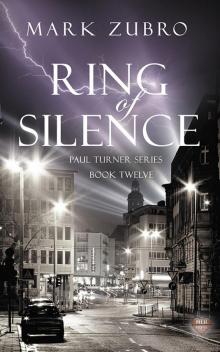 Ring of Silence
Ring of Silence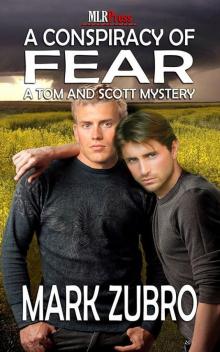 A Conspiracy of Fear
A Conspiracy of Fear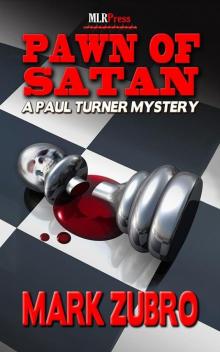 Pawn of Satan
Pawn of Satan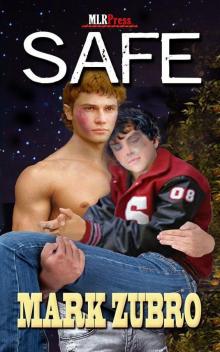 Safe
Safe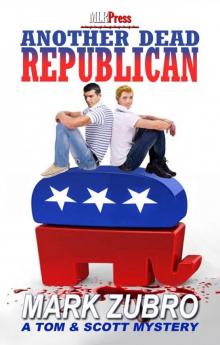 Another Dead Republican
Another Dead Republican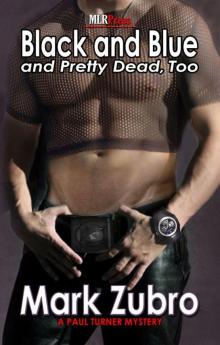 Black and Blue and Pretty Dead, Too
Black and Blue and Pretty Dead, Too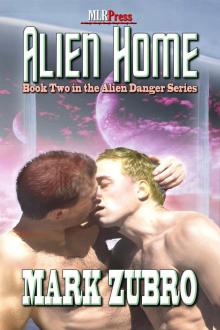 Alien Home
Alien Home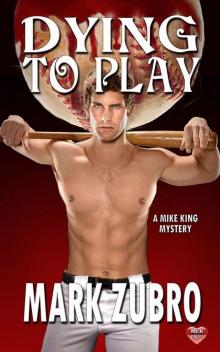 Dying to Play
Dying to Play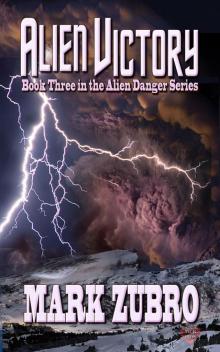 Alien Victory
Alien Victory